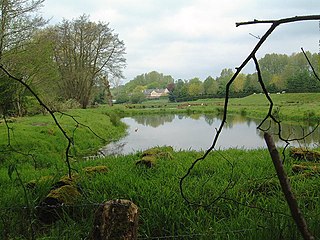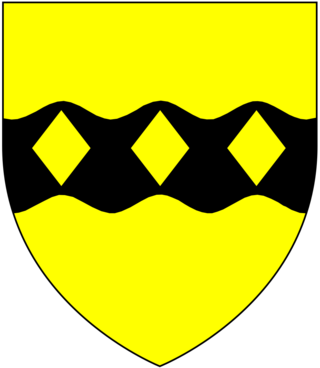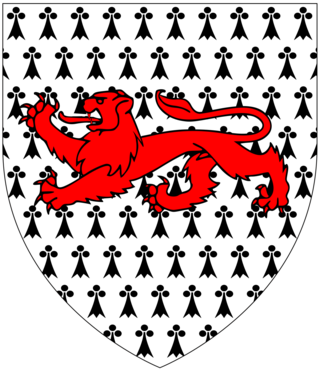


Thomas Rose (1679-1748) [2] of Wootton House in the parish of Wootton Fitzpaine in Dorset was Sheriff of Dorset in 1715. [3]



Thomas Rose (1679-1748) [2] of Wootton House in the parish of Wootton Fitzpaine in Dorset was Sheriff of Dorset in 1715. [3]
The earliest recorded member of the Rose family is John Rose of St Burlado (Saint Brélade) on the Island of Jersey, who served as Mayor of Lyme Regis in Dorset in 1611. He married Fayth Ellesdon, a daughter of Ralph Ellesdon. [4] His son was Richard Rose (died c. 1658), a Member of Parliament for Lyme Regis (1639–55), who married Elizabeth Henley, a daughter of Henry Henley of Leigh. [4]
He left an only child and sole heiress: [5]
He died on 9 January 1747/48, aged 68. [6] "A stone of eight ounces and one dram was found in his kidneys". [7] His mural monument survives in Broadhembury Church, Devon, erected by his daughter Mrs Drewe. It displays at top the canting arms of Rose: Sable, on a pale or three roses gules slipt and leaved proper; Crest at top: A rose slipped and leaved; bottom: Drewe (Ermine, a lion passant gules) impaling Rose. It is inscribed as follows:

Lyme Regis is a town in west Dorset, England, 25 miles (40 km) west of Dorchester and east of Exeter. Sometimes dubbed the "Pearl of Dorset", it lies by the English Channel at the Dorset–Devon border. It has noted fossils in cliffs and beaches on the Jurassic Coast, a World Heritage Site and heritage coast. The harbour wall, known as The Cobb, appears in Jane Austen's novel Persuasion, the John Fowles novel The French Lieutenant's Woman and the 1981 film of that name, partly shot in the town. A former mayor and MP was Admiral Sir George Somers, who founded the English colonial settlement of Somers Isles, now Bermuda, where Lyme Regis is twinned with St George's. In July 2015, Lyme Regis joined Jamestown, Virginia in a Historic Atlantic Triangle with St George's. The 2011 Census gave the urban area a population of 4,712, estimated at 4,805 in 2019.


Charmouth is a village and civil parish in west Dorset, England. The village is situated on the mouth of the River Char, around 1+1⁄2 miles (2 km) north-east of Lyme Regis. Dorset County Council estimated that in 2013 the population of the civil parish was 1,310. In the 2011 Census the population of the parish, combined with the small parish of Catherston Leweston to the north, was 1,352.

Wootton Fitzpaine is a village and civil parish in the county of Dorset in South West England. It lies approximately 3 miles (4.8 km) north-east of Lyme Regis in a small side valley of the River Char, close to the Marshwood Vale. The civil parish covers an area of 3,307 acres (1,338 ha) and includes the ecclesiastical parish and small settlement of Monkton Wyld to the west. In the 2011 census the civil parish had 180 dwellings, 134 households and a population of 345.
Whitchurch Canonicorum Hundred or Whitechurch Canonicorum Hundred was a hundred in the county of Dorset, England, containing the following parishes:
Broadhembury is a village and civil parish in the East Devon district of Devon, England, 5 miles (8 km) north-west of Honiton.

Kerswell Priory was a small Cluniac priory in the parish of Broadhembury in Devon, England.

Nicholas Duck, of Heavitree and of nearby Mount Radford in the parish of St Leonards, both next to Exeter in Devonshire, was an English lawyer who served twice as a Member of Parliament for Exeter, in 1624 and 1625. He was one of the Worthies of Devon of the biographer John Prince (1643–1723), whose wife was his great-niece.

Richard Rose was an English merchant and politician who sat in the House of Commons from 1640 to 1648.

Edward Drew (c.1542–1598) of Killerton, Broadclyst and The Grange, Broadhembury, Devon, was a Serjeant-at-Law to Queen Elizabeth I. He served as a Member of Parliament for Lyme Regis in 1584, twice for Exeter in 1586 and 1588 and in 1592 for the City of London. He occupied the honourable position of Recorder of the City of London.

Henry Henley (1612–1696) was an English politician who sat in the House of Commons at various times between 1653 and 1681. He supported the Parliamentary cause in the English Civil War.

William Pole (1515–1587), Esquire, was a lawyer and speculator in church lands following the Dissolution of the Monasteries who served as MP for Lyme Regis in 1545, Bridport in 1553 and for West Looe in 1559. He acquired lands in East Devon and was the founder of the influential and wealthy Pole family of Shute, Devon. He was the father of the famous Sir William Pole (1561-1635), the antiquary, historian of Devon.

Sharpham is an historic estate in the parish of Ashprington, Devon. The Georgian mansion house, known as Sharpham House, overlooks the River Dart and is a Grade I listed building. The house was commenced in about 1770 by the Royal Navy captain Philemon Pownoll to the designs of the architect Sir Robert Taylor (1714–1788). In the opinion of Nikolaus Pevsner it contains "one of the most spectacular and daring later 18th century staircase designs anywhere in England". The park and gardens are Grade II* listed in the National Register of Historic Parks and Gardens. Part of the descent of Sharpham is shown on the Palmes family heraldic pedigree roll.

Mount Radford is an historic estate in the parish of St Leonards, adjacent to the east side of the City of Exeter in Devon.

Samuel Drewe (1759-1837) of Kensington in Middlesex, was Governor of the Bank of England from 1828 to 1830. He had been Deputy Governor from 1826 to 1828. He replaced John Baker Richards as Governor and was succeeded by John Horsley Palmer.

The Drewe family of Broadhembury are generation owners and inhabitants of The Grange, Sharpham, Broadhembury, Wadhurst Park, Devon, in the west and east of England, from the 16th century to the current date.

Francis Drewe, of the Grange, Broadhembury, Devon, was a British lawyer and Tory politician who sat in the House of Commons from 1713 to 1734.
John Burridge (c.1681–1753) of London and Lyme Regis, Dorset was a British merchant and Whig politician who sat in the House of Commons from 1710 to 1728.